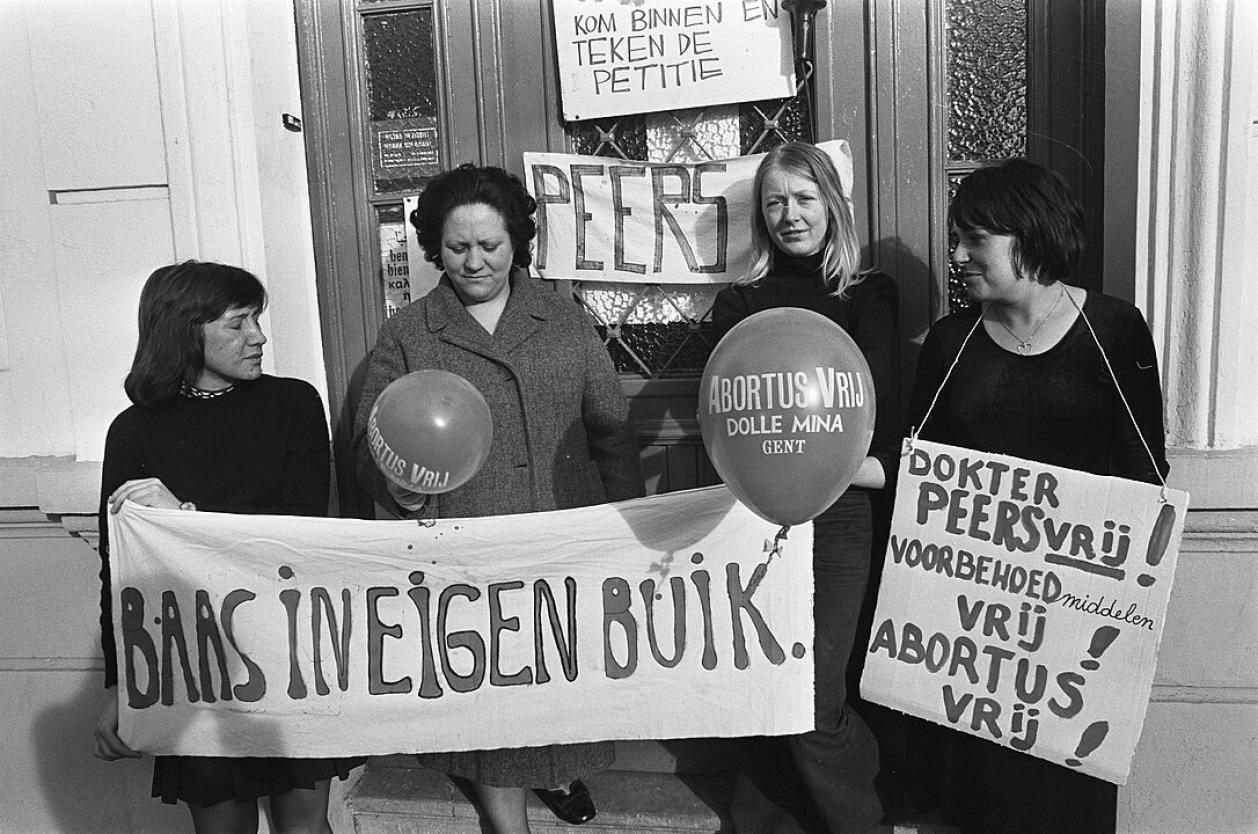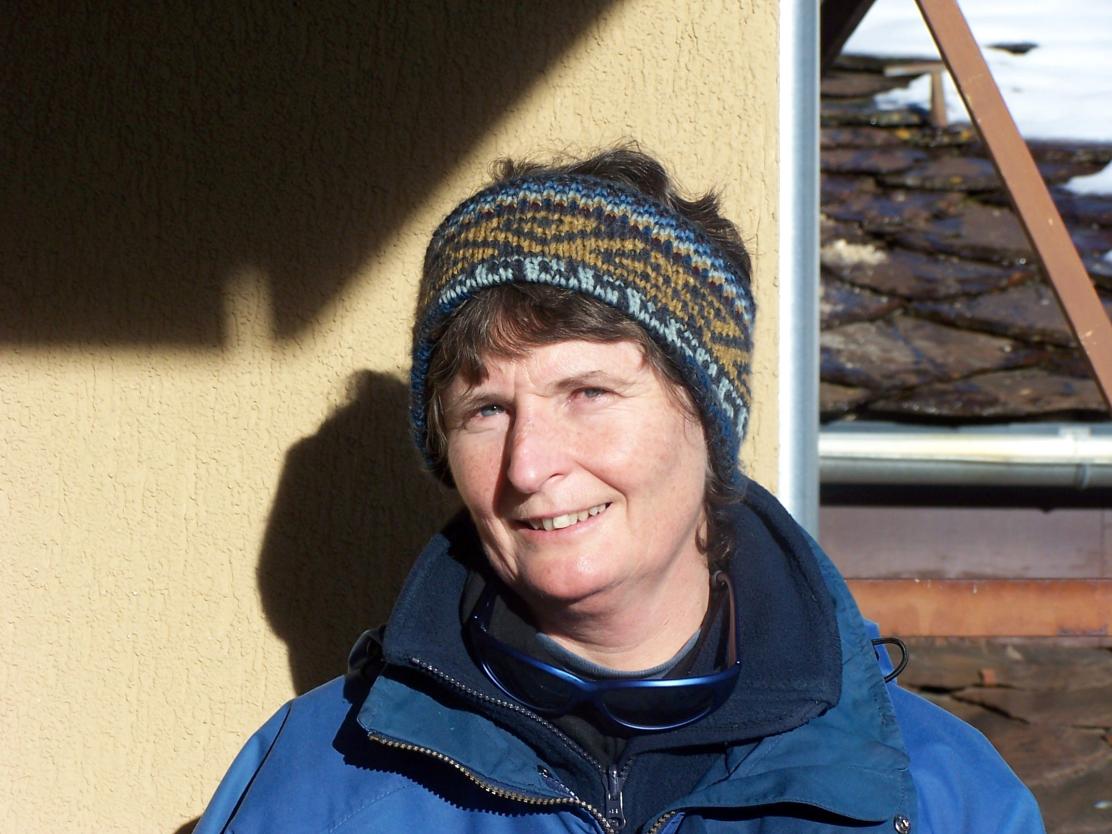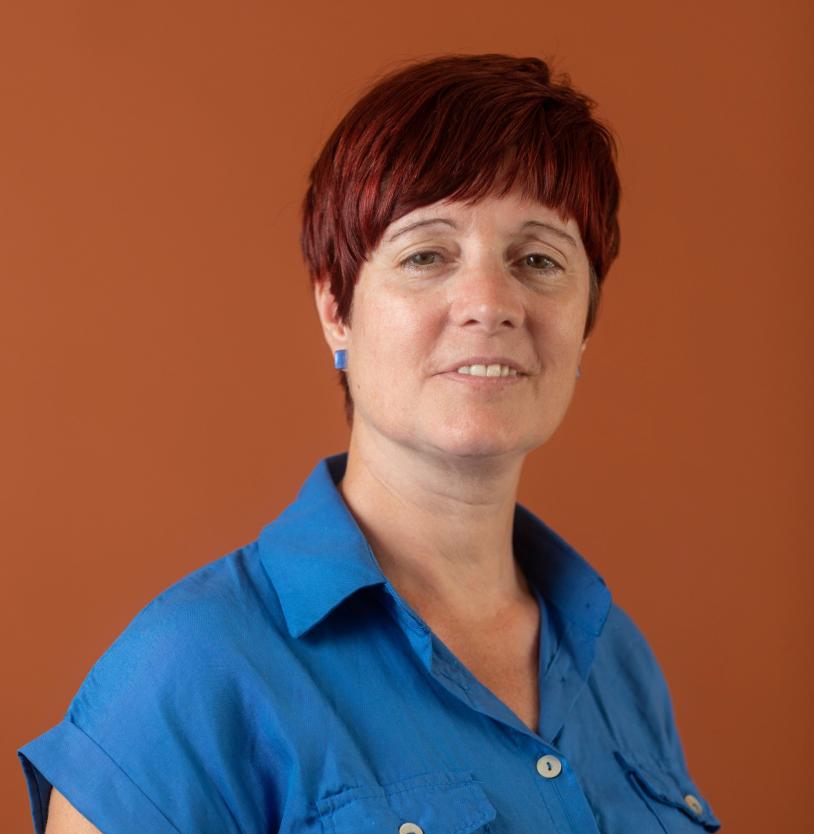
Since 1990, abortion has been legally regulated in Belgium, but not without controversy. The VUB has been – and continues to be – a trailblazer in the liberalisation of abortion laws. We discuss the past and present of these developments with Dr Anne Verougstraete, a founding member of VUB-Dilemma, VUB’s abortion support centre, and Nausikaä Martens, the current coordinator.

Protest in 1973 in Ghent (Belgium) against the arrest of Dr. Willy Peers.
Photographer: Bert Verhoeff /Anefo, copyright holder: National Archives
Dr Verougstraete, you've witnessed the turbulent fight for abortion rights from its early years. What triggered the movement?
Anne Verougstraete: “Post-May 68, ‘My Body, My Choice’ was a hot topic. Two years later, the Belgian Society for the Legalisation of Abortion was founded. Gynaecologist Willy Peers was instrumental in this. His role in the abortion debate cannot be overstated. From the early 70s, he performed hundreds of abortions and advocated for unrestricted access to contraception, which was illegal in Belgium until 1973. Peers saw abortion rights as part of legitimate family planning. In 1973, he was arrested following an abortion performed on a minor with a mental disability who had been raped by her foster father. The case became a flashpoint. Dr Peers spent 34 days in jail, and during that time, there was uproar in Belgium calling for his release. He was ultimately never convicted; the authorities didn’t dare. But the case did lead to the first abortion carried out outside a hospital in 1975. Several hospitals affiliated with ULB and the ULB Family Planning Centre continued to perform them. VUB, for its part, decided to allow abortions at AZ-VUB while the process was illegal, with Professor JJ Amy at the forefront."
“We used symbols in patient records that no one could decipher”
As a pioneering abortion doctor, how did you work?
Anne Verougstraete: “Indeed, since 1979, I’ve performed pregnancy terminations that were illegal and thus risked prosecution. We proceeded cautiously, using indecipherable symbols in patient records to protect the women who had undergone abortions. These records were hidden in a bank vault; the wife of the AZ-VUB director personally delivered them. Even our adversaries respected us. The prosecutor’s wife or girlfriend would come to us for an abortion, let’s say.”
Yet it wasn’t until 1990 that abortion, under certain conditions, was decriminalised
Anne Verougstraete: “Correct. At the time, Catholic Flanders had a very powerful party, the CVP [the forerunner of today’s Christian democrat party CD&V], which for a long time obstructed any change in the law. The Palace was also staunchly opposed. In 1990, the abortion law was passed. Now, performing or undergoing an abortion is legal in Belgium up to the 12th week post-conception, without medical grounds and after a mandatory six-day waiting period.”

Anne Verougstraete
Fast forward to today: do girls and women seeking an abortion find it easy to access a centre?
Nausikaä Martens: “Generally, I believe women can find support because abortion has become a discussable topic in society. They are often referred by their general practitioner or gynaecologist, which is positive. There’s a consensus that everyone should have access to good and safe abortion care. What we haven’t achieved yet is women openly saying: ‘I’ve had an abortion.’ That remains taboo.
Anne Verougstraete: “Those struggling to find help are often undocumented individuals. Delays in the refund process through social services, even after requesting urgent medical help, are a concern. There’s definitely work to be done there.”

Nausikaä Martens
“One in five 50-year-old women will have had an abortion”
This year, VUB-Dilemma and Luna vzw launched the Abortion, What Next? campaign, calling for a new abortion law. What does it entail?
Nausikaä Martens: “We are first and foremost challenging the current timeframe for abortions. Currently, termination is only allowed in the first 12 weeks post-conception – 14 weeks from the last menstruation – while in the Netherlands, for example, it’s permitted up to the 22nd week. We also want to remove the patronising and humiliating waiting period mandated between the initial consultation and the actual procedure. People often forget that the contemplation process starts well before that first appointment.”
Anne Verougstraete: “The experts [in a report that Verougstraete contributed to] are calling for an extension of the abortion timeframe to at least 18 weeks post-conception and the elimination – at least in law – of the waiting period. Let the woman and the care practitioner decide the time needed to make an informed decision. For instance, there’s no compulsory waiting period for sterilisation; it’s done through consultation. Women won’t proceed with an abortion if they’re not ready.”
Where is the main opposition coming from today?
Nausikaä Martens: “As always, mainly from the Catholic side. There’s also significant opposition from the centre-right. The controversy isn’t so much over the waiting period, I think, but over extending the term. There’s a stubborn belief that abortion after 12 weeks is morally and ethically indefensible.”
Anne Verougstraete: “The issue is that those women, about 500 a year, will still seek abortions but must travel to the Netherlands at their own expense due to less stringent rules. For some extremely vulnerable women, the procedure there is too expensive, resulting in them carrying unwanted pregnancies to term. What’s the sense in that? It’s not OK. Belgium needs to address its own psycho-social problems and not offload them to the Netherlands.”
In conclusion, what are your short-term hopes?
Nausikaä Martens: “That our recommendations will quickly become law. But also that the myths surrounding abortion dissipate. Ultimately, abortion is not an exception: one in five women will encounter it in her lifetime.”
Anne Verougstraete: “We hope for abortion to be normalised, integrated into health law, and treated and reimbursed accordingly. It’s true: take 10 50-year-old women, and two of them will have terminated a pregnancy. But, until now, everyone has remained silent about it.”
*VUB-Dilemma is a support service at the Vrije Universiteit Brussel that specialises in counselling for women faced with unwanted pregnancies
Profiles
Dr Anne Verougstraete is a gynaecologist trained at VUB, a pioneer among Belgian abortion doctors and a former head of VUB-Dilemma. Though now retired, she still works there one day a week. She is a member of FIAPAC, the International Federation of Abortion and Contraception Professionals and the European Society of Contraception and Reproductive Health.
·Nausikaä Martens has been the coordinator of VUB-Dilemma since 2018 and is the chair of FIAPAC.